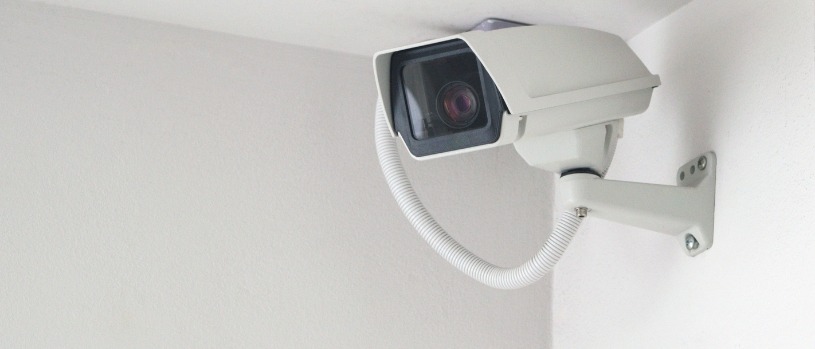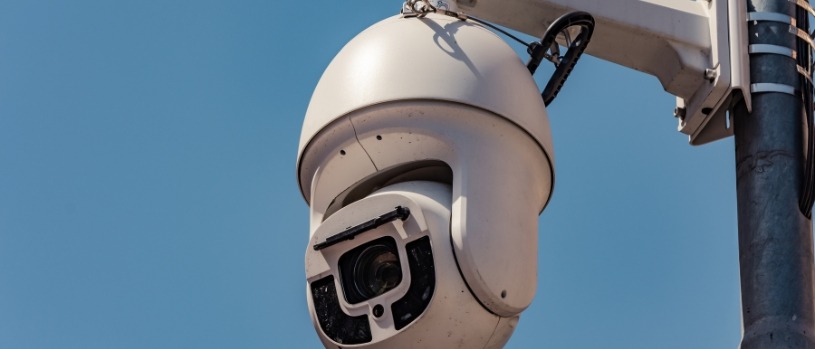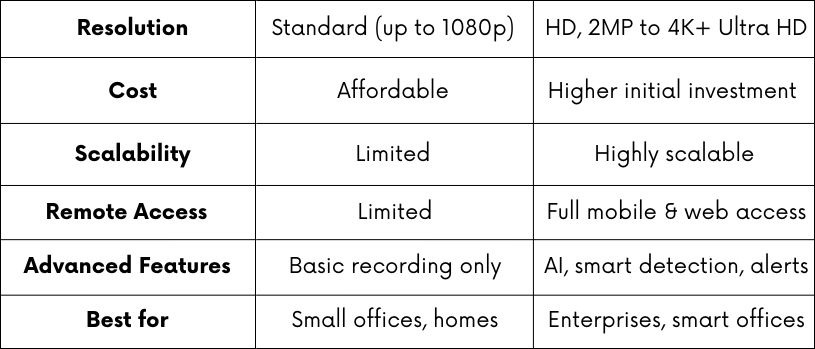Clarity Meets Cost: Choose Between IP and Analog
Compare IP vs Analog CCTV cameras—clarity, cost & features. Discover the right security solution for your business with Astfast Infotech.
CCTV


When it comes to securing your office, home, or industrial space, one of the most common questions is: Should you choose IP CCTV cameras or Analog CCTV cameras? Both technologies offer unique benefits, but the right choice depends on your budget, security requirements, and future scalability. To help you make a more informed security investment, let's dissect the contrast.
Understanding Analog CCTV Cameras
For many years, CCTV cameras have remained analog. They capture video and send it to a DVR (Digital Video Recorder) via coaxial lines.
Principal Benefits of Analog CCTV:
Cost-effective: Less money spent up front on installation.
Simplicity: Simple to assemble and run.
Compatibility: Compatible with earlier systems.
Reliable: Less likely to experience network problems.
Limitations of Analog CCTV:
Analog CCTV's drawbacks include its lower video resolution as compared to IP cameras.
restricted capabilities for distant viewing.
As your security requirements increase, scalability may become difficult.
Analog cameras are still a popular choice for small offices, shops, and budget-conscious businesses.


Understanding IP CCTV Cameras
IP (Internet Protocol) CCTV cameras are the modern standard for surveillance. They transmit video through a network and are compatible with NVRs (Network Video Recorders) or cloud-based systems.
Key Advantages of IP CCTV:
High Resolution: Crystal-clear images, up to 4K or more.
Smart Features: Motion detection, face recognition, night vision, and AI-based analytics.
Remote Access: Watch video on desktop computers or mobile apps from any location.
Scalability: The ability to easily grow as your company does.
Future-Ready: Ideal for smart offices and enterprises.
Limitations of IP CCTV:
Higher initial investment.
Requires a reliable networking and internet configuration.
For businesses seeking greater clarity, sophisticated monitoring, and long-term protection, IP cameras are the preferred option.


IP vs Analog: A Quick Comparison Table
Feature
Analog
IP


Which Should You Choose?
If you are looking for a budget-friendly solution for a small shop, retail store, or office with limited surveillance needs, Analog CCTV is a practical choice.
If you need crystal-clear footage, advanced analytics, and remote monitoring, especially for large offices, warehouses, or enterprises, IP CCTV is the right investment.
Final Thoughts
The key is to balance clarity vs cost, while considering your long-term security goals.
In contemporary security, both IP and analog CCTV cameras play a role. For modest setups, analog is still a cost-effective choice, but IP cameras offer unparalleled resolution and intelligent features for forward-thinking companies.
Select a reliable partner that is knowledgeable about both technologies when you're ready to secure your workplace with the best CCTV (Closed-Circuit Television) system. CCTV installation, workplace security solutions, biometric systems, networking, and maintenance services catered to your company's requirements are our areas of expertise at Astfast Infotech.

📞 Call to Action
Don’t compromise on safety!
👉 Contact Astfast Infotech today at +91 9907430599 or visit www.astfast.com to get the best CCTV solution for your office security—whether IP or Analog.
FAQs
1. What is the difference between IP and Analog CCTV cameras?
IP cameras transmit video over the internet or a network with higher resolution and smart features, while Analog cameras use coaxial cables and DVRs for basic recording.
2. Which CCTV is better for business—IP or Analog?
For small businesses on a budget, Analog is cost-effective. For enterprises or offices that need clarity, scalability, and remote access, IP is the better choice.
3. Do IP cameras provide better image quality than Analog?
Yes. IP cameras offer HD to 4K resolution, while Analog cameras usually max out at 1080p. This makes IP ideal for identifying details in surveillance.
4. Are IP CCTV cameras more expensive than Analog?
IP cameras have a higher upfront cost due to advanced technology and networking requirements, but they offer better long-term value with scalability and smart features.
5. Can I access my CCTV remotely with Analog cameras?
Remote access is very limited with Analog systems. IP CCTV cameras, however, allow real-time monitoring through mobile apps or desktop software.
6. Which CCTV system is easier to install—IP or Analog?
Analog CCTV is easier to install for small setups. IP CCTV requires a proper network setup but offers more flexibility and scalability.
7. Do IP CCTV cameras need the internet to work?
IP cameras can record locally on an NVR without the internet, but internet connectivity is needed for remote viewing and cloud storage.
8. How long can Analog CCTV footage be stored?
Analog footage depends on DVR storage capacity, usually 15–30 days. IP cameras can store footage on NVRs, cloud storage, or external servers for longer durations.
9. Which CCTV system is more secure against hacking?
Analog systems are less vulnerable since they’re offline. IP cameras must be secured with encryption, strong passwords, and firewalls to prevent hacking.
10. How do I decide between IP and Analog CCTV for my office?
Consider your budget, space size, and security needs. Analog is cost-effective for small setups, while IP is future-ready, scalable, and ideal for advanced security.
